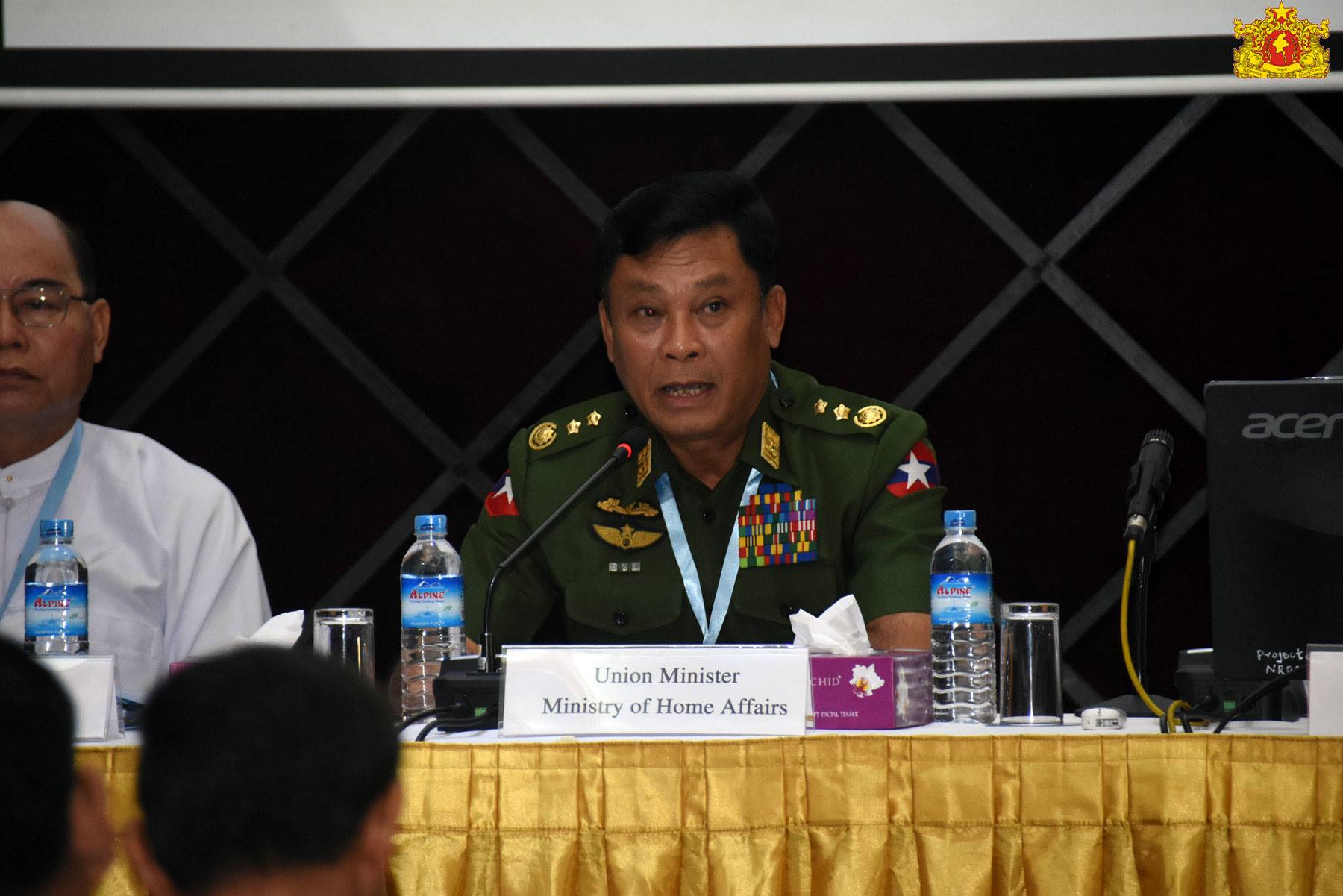The Ministry of Home Affairs on Tuesday doubled down on an earlier accusation from the government that international and local non-governmental organisations (NGOs) played a part in the deadly attacks staged by Muslim militants in northern Arakan State last week.
At a meeting in Rangoon on Tuesday, national security adviser Thaung Tun debriefed gathered diplomats on the latest developments out of troubled Arakan State, where the militants’ coordinated assault on upwards of 20 police and military outposts on 25 August has been followed by intensive counter-insurgency operations.
Home Affairs Minister Lieutenant-General Kyaw Swe, also on hand, accused local and international NGOs of being a source of material support to the attackers, once again injecting the sensitive issue of aid groups’ presence in Arakan State into the region’s broader security context.
“Some NGOs and INGOs are importing the steel pipes and ammonia fertilisers to Buthidaung and Maungdaw [townships] for development [purposes]. When the terrorists have gotten hold of these things, they made improvised explosive devices out of them and the security forces were attacked,” said the Union minister.
His remarks came a day after state media first raised the possibility that INGOs had a role in last week’s attacks.
“While the extremist terrorists were besieging and blocking the Taungbazar village on 26 August, the news that some INGO staffs were seen in the terrorist group was secured. The investigation is going on to verify the news,” read an article in Monday’s Global New Light of Myanmar.
That reportage, which did not go into further detail, was followed in the article by a reference to a previously announced discovery last month of World Food Programme biscuits at what the government described as a terrorist training camp in Arakan State’s Mayu mountains.
UN High Commissioner for Human Rights Zeid Ra’ad Al Hussein on Tuesday criticised the State Counsellor’s Office for statements linking INGOs to the attacks.
“Such statements are irresponsible and only serve to increase fears and the potential for further violence,” he said in a statement. “I am extremely concerned that the unsupported allegations against international aid organizations place their staff in danger and may make it impossible for them to deliver essential aid.”
The presence of NGOs and INGOs in the western state is a delicate matter, with local Arakanese Buddhists on more than one occasion staging demonstrations to protest what they claim is aid groups’ bias in favour of the stateless Rohingya minority. These sentiments reached their most fevered pitch in March 2014, when rioting targeted aid groups including the ransacking of the WFP’s offices in the state capital Sittwe.
“WFP is aware of a photo of one box of WFP biscuits reportedly found in a training camp last month,” Silke Buhr, WFP’s regional communications officer for the Asia-Pacific, told DVB on Monday. “WFP takes any allegation of food diversions very seriously and we have requested more details from the authorities and asked to see the batch number of the biscuits as this will allow us to trace its origins and distribution site. We are still waiting for these details to be provided.”
‘We will defend ourselves, but all legally’
Thaung Tun, the national security adviser, said the Burmese government would exercise its lawful right to defend the country from terrorists, while respecting human rights and acting with discipline.
“We will defend ourselves, but all legally. And we will do our best to protect entirely our sovereignty,” he said.
“The extremist terrorists committed the violence to seize Maungdaw and Buthidaung, to make it an established Muslim region,” said Kyaw Swe, the home affairs minister.
On Tuesday, Kyaw Swe also said some of the funding of the militants operating in northern Arakan State — who have identified themselves as members of the Arakan Rohingya Salvation Army (ARSA) — came from the illicit narcotics trade, which has plagued many parts of Burma’s porous border regions for decades.
The 25 August attacks and their aftermath mark the most dramatic escalation in violence in northern Arakan State since ARSA militants carried out a similar but smaller-scale assault in October.
Military “clearance operations” in pursuit of the perpetrators were dogged by allegations of widespread human rights violations allegedly perpetrated by security forces, though the government and Tatmadaw have steadfastly denied any major abuses took place.
It is against that backdrop that human rights advocates and the UN’s top human rights official have urged security forces to exercise restraint in the wake of the latest ARSA offensive.
[related]
At a separate press conference organised by the Tatmadaw on Tuesday in Naypyidaw, Major-General Soe Naing Oo sought to assure that security forces were differentiating between militants and innocent civilians.
“We need to distinguish between the Bengali extremist terrorists and other Bengalis who want to live peacefully there. … When the Bengalis cooperate for questioning, weapons are not used,” said Soe Naing Oo of the Tatmadaw’s True News Information Team, responding to a question from the Australian military attaché about how security forces were ensuring that counter-insurgency efforts were proportional to the threat posed by ARSA.
According to the Myanmar Police Force, militants have staged 66 attacks in Maungdaw, Buthidaung and Rathedaung townships since 25 August. Those attacks and counter-insurgency operations have seen at least 110 people killed, including more than 10 members of the security forces, dozens of Muslim militants and civilians.
Thousands of both Buddhists and Muslims have reportedly fled their homes, with many from the latter group crossing the border into Bangladesh.
“The villagers are fleeing to Maungdaw town because they are afraid to stay at their villages. In Buthidaung and Maungdaw, the civilian administration is weak, that’s why the Myanmar Police Force and military are cooperating in the clearance operation,” said Police Brigadier-General Win Tun of the Myanmar Police Force.



